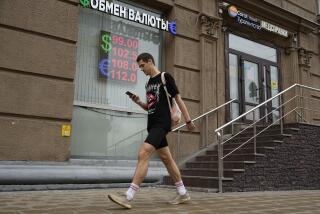Russian Bailout Called Threat to Reforms
- Share via
MOSCOW — As President Boris N. Yeltsin embarked Wednesday on a surprise vacation by the Black Sea, a political storm grew in Moscow over a controversial directive from the Russian Central Bank that critics claim will mean the end of radical economic reform here.
The Central Bank issued an order last week that, in effect, mandates the payoff of 3 trillion rubles--$18.6 billion at the current rate--in debts that Russian state-owned factories owe each other. The massive bailout will help keep industry running but risks sending inflation soaring.
“This can definitely be considered the end of the epoch of (Yegor T.) Gaidar,” the acting prime minister who freed prices in January, the prestigious Nezavisimaya Gazeta announced under a banner front-page headline Wednesday.
Gaidar had struggled to cut heavy government financing of industry and to force factories to find ways to pay for themselves while he worked on balancing the budget, slowing inflation and strengthening the ruble. Russian factories lobbied to keep their fat subsidies and raise wages, warning that if they went bankrupt, mass unemployment would result.
“For half a year, there has been a war of nerves between the government and state industry,” Nezavisimaya Gazeta said. Now “industry has won.”
The final outcome of the dispute is actually not yet clear. Russian Economics Minister Andrei Nechayev said Tuesday that the Central Bank “should cancel” the parts of its directive that would require printing more money. He admitted, however, that the Cabinet, after a stormy discussion, remained split over what to do about the directive.
Russian State Bank Chairman Viktor Gerashchenko, who issued the order on the debt payoff, acknowledged that it is flawed in that it would help save even inefficient factories that deserve to go bankrupt.
“But what other alternative do we have?” he asked in an interview with the daily newspaper Izvestia.
Yeltsin, busy with a Russian-Ukrainian summit meeting and a visit to Bulgaria during the last week, has not commented on the dispute. In Bulgaria, he merely reasserted that his reforms moving Russia from a centrally planned Communist system to a market-driven one were on course, declaring: “The year 1993 will bring relief. I am sure of that.
“I know the mood of the people and the existing state of our economy and finances,” he said.
It did not seem a mark of confidence, however, that Yeltsin flew off to a Black Sea resort near the town of Sochi without giving any notice that he was planning a vacation.
In fact, he had stated less than a month ago that he would not take a vacation this summer--an understandable precaution for a leader hoping to avoid a repeat of Mikhail S. Gorbachev’s vacation last year, when the then-Soviet president found himself and his family suddenly imprisoned in their Crimean seaside villa, caught by a long-planned putsch.
It was discovered that the sports-minded Yeltsin planned to take time off when reporters for the Interfax news agency said they had seen the presidential tennis rackets being loaded onto his plane.
Presidential spokesman Vyacheslav Kostikov later confirmed that Yeltsin, his two daughters and three grandchildren will be relaxing together at the seaside.
More to Read
Sign up for Essential California
The most important California stories and recommendations in your inbox every morning.
You may occasionally receive promotional content from the Los Angeles Times.













